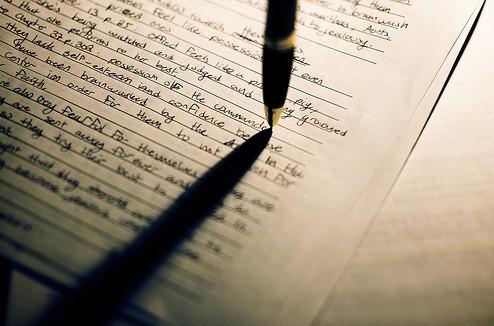当前位置:首页 > 托福频道 > 托福写作 > 【师资详解】如何从细节处攻克托福独立写作?
发布时间:2016-04-22 关键词:【师资详解】如何从细节处攻克托福独立写作?
摘要:老师在托福培训课上强调,托福写作满分标准明确要求考生做到:文章结构清晰、能充分展开,使用适当的解释说明、例证或细节。如何达到满分标准要求,针对论证给出适当、充足的细节是困扰无数考生的难点。
老师在托福培训课上强调,托福写作满分标准明确要求考生做到:文章结构清晰、能充分展开,使用适当的解释说明、例证或细节。如何达到满分标准要求,针对论证给出适当、充足的细节是困扰无数考生的难点。

原文如下:
“An essay is well organized and well developed, using clearly appropriate explanations, exemplifications, and/or details.”
对于大多数考生而言,针对给定话题找出理由、利用解释说明和例证支持展开论证难度不大。但如何达到满分标准要求,针对论证给出适当、充足的细节却是困扰无数考生的难点。在此笔者结合近千位考生在备考过程中常见的“细节问题”归纳整理、辅以实例,以“五问五答”的形式助力考生“赢在细节”,向满分刺。
一问:给不出细节怎么办?
答:给细节是一种技巧,好比一层窗棂纸,一捅就破,毫不费力。备考练习中配合不同的论证手法,给细节的技巧也不尽相同,主要有以下两种:
、“上下意重复法”。细节描述必然出现在解释说明或例证支持之后,做为论证的具体展开而存在。对于举例论证而言,考生可以借鉴GRE类比题的解答方法,通过上下意重复给出细节。
“上下意”是对词汇语意范围的一种界定。通常来说,利用“头脑风暴”任意举出一个名词,我们总能找到它的“上意词”或“下意词”。例如,我们日常生活中使用的“微波炉(microwave oven)”,它是一种家用电器,那么它的上意词可定义为“电器设备(electronic device)”,而说到电器设备我们又可以微波炉为参照物给出“电冰箱(refrigerator)”、“电视机(television)”、“空调(air conditioner)”等,这就构成了电器设备的下意词。利用这种技巧,考生可以在例证支持中给出上意词,再以多个下意词做为具体细节展开论证。下面是一位考生的习作:
“The development of modern technology does bring much convenience to our daily life. For example, electronic device has been widely used in families.”
这位考生给出论点:现代技术为我们的日常生活带来诸多便利。再给出例证支持:电器设备已经进入家庭。我们要求考生向着满分标准刺,务必“赢在细节”,利用“上下意重复法”找出“电器设备(electronic device)”的下意词,给出细节:
“The development of modern technology does bring much convenience to our daily life. For example, a number of electronic devices, such as microwave oven, refrigerator and television, have been widely used in families.”
此外也有相当一部分考生在解释说明和例证支持时已经做到了“细致入微”,妨碍了论证的进一步展开。例如:
“Although the average pay is much less than that of big cities, vegetables are usually less expensive.”
这位考生给出论点:小城镇的物价比大城市便宜。再给出解释说明:尽管(小城镇的)平均报酬比大城市低,但蔬菜的价格也通常更便宜。考生对解释说明和细节支持之间的关系把握不好,导致解释不够权威,细节不够充足。
针对这部分考生,我们要求在解释说明时务必先写“上意词”圈定范围,然后再给出充足的细节支持,使层次更加清晰:
“Although the average pay is much less than that of big cities, daily necessities, such as vegetables and meat, are usually less expensive.”
第二、“W&H法”。参加过SAT考试的考生深受SAT写作技法的影响,喜欢讲故事。例如,一位曾获得SAT写作的学员在解答托福写作交流交友类话题时就习惯性地叙述了他如何参加毕业舞会(prom),如何与最耀眼的舞会皇后(Prom Queen)相识,如何邀请她共舞一曲的全过程。触类旁通、事半功倍,这位考生最终在托福写作部分取得了29分的好成绩。
事实证明,ETS在考察写作能力时虽然针对不同目的、不同人群设计了不同的考试,但横向比较不难发现,各种考试之间也存在共通点。考生熟练掌握一种写作技法,给出充足的细节使故事叙述足够完整,可以在不同的考试中取得理想的成绩。
在此考生务必要问清自己4个“W”和1个“H”(when, where, who, what, how),将事情发生的时间、地点、人物、过程等各个细节充分展现在考官面前。例如考生论证存钱应急比花钱消费更重要,并叙述了他的朋友在车祸前后的故事:
“For example, I have a friend named Victor. He is not rich but keeps a good habit of depositing a certain amount of money into the bank account each month. He sometimes complained to me because saving disabled him to spend money buying something he desired. But last month, while he rode to school in the rush hour, he was involved in a horrible accident and injured severely. So a large amount of money was immediately required for an operation. Most of the family’s deposit was put into use and fortunately, he got through this nightmare. Now he feels so blessed and grateful that he keeps this habit of saving and this incident strikes him tremendously to realize how significant the deposits are to ordinary people.”
这段论述平铺直叙,易于模仿,尤其贵在细节充足。时间、地点、人物和事情的前因后果一目了然。通过如此详尽的叙述,“存钱是未雨绸缪”这一论点也得到了更强有力的支持。
二问:所谓细节“细”到什么程度?
答:满分标准只要求给出适当、充足的细节,却并没有明确指出“细”到什么程度,因此具体问题要具体分析。
考场实战中,细节能“细”到什么程度完全取决于考生的日常积累和语言实力。例如论证低碳生活对治理污染有所助益,一位环境工程专业的考生就做出了如下论证:
“Low carbon life style may help regulate the climate, conserve water and soil, improve air quality, and eliminate smoke and dust.”
由此看来只要考生在备考过程中注意积累,结合所学专业和兴趣点,给出学术性和权威性的细节并不难。
但对于大多数考生而言,时间紧、任务重,因此控制好细节的尺度就显得尤为重要。通过量的练习调整务求找到适合自己的尺度。考生如果感觉上述关于低碳生活的论证过于专业,也可以从更通俗的角度改写细节:
“Low carbon life style may help alleviate air pollution, improve water quality and provide us with a better living environment.”
三问:细节给多少合适?
答:细节的数量取决于论证中解释说明和例证支持的层次。当考生只引用一个例证来支持给出的论点时,细节必然要多给一些、具体一些;然而当考生引用多个例证来支持给出的论点时,每个例证都要给出细节,却不必每处细节都一一详述。例如,考生在论证科技进步使生活变得更轻松时,若只引用微波炉为例,就务必要给出多个细节:
“For instance, microwave oven has been widely used in families. Using a microwave oven for cooking can not only heat up the food faster, but also provide a smoke-free cooking environment. Housewives are able to make use of the extra time saved from cooking to do many other things. Smoke created when cooking in traditional ways is always a threat to people’s health, while a microwave oven will solve the problem easily by using an environment friendly power, radiation power.”
同样是论证科技进步使生活变得更轻松,若引用微波炉、电冰箱、计算机等多个例证时,给出细节可以有详有略,但务必保证每个例证都有细节支持:
“Life abounds with such examples. By using microwave ovens, the process of cooking is cleaner and faster than the traditional way and consequently this makes the dishes more favorable for people’s health and saves a lot of time for people to do more important things. The refrigerator provides an access to the storing of food more conveniently, and thus it is now possible for people to buy many foods at one time instead of purchasing them in small quantities and go to the supermarket every day. No one can deny that people really benefit a lot from the invention of computers. They accomplish a variety of things through computers including searching for the latest information and chatting online with families and friends.”
四问:细节要真实吗?
答:当然不是。托福写作真题中明确要求“使用具体的理由和例证支持你的论证(use specific reasons and examples to support your answer)”,但并没有强调支持论证的细节必须真实。因此考生在不违反常识的情况下可以充分发挥想象,切勿画地为牢、作茧自缚。例如考生在论证人际交往中互相理解的重要性时,就可以假设自己是犹太教徒,而邻居是一位五星级大厨,从而展开一番饶有趣味的描述:
“Of course, while friendliness and capabilities are important, without a mutual understanding and consideration, any neighbor can be horribly frustrating. Imagine my neighbor who happens to be a five star chef invites me over for dinner. Though he certainly has the appropriate talents for cooking, and the good will to invite me, if he failed to consider my culture or personal preference, I might not go for the meal at all. More specifically, if I were Jewish and followed my religious limitation on food, I would not be able to eat many different kinds of food. Thus, without consideration for my culture, all of the good-will my neighbor might bring would be useless.”
在此基础上,一些考生还会纠结于是否在例证支持中引用名人轶事做为论证细节。我们不妨再读满分标准,适当和充分显然不等于引经据典。所谓“世上本无事”,名人轶事虽好,但用在托福考试中并不会比描述跟你一起玩耍的小伙伴更加“高大上”,更何况积累素材要占用大量备考时间,得不偿失。退一步说,如果要引用名人轶事,在不违反基本常识的前提下,考生也尽可以发挥想象力,细节只要为论证服务,真实与否并不重要。曾记得某位同学举例说他喜欢耶稣,理由是“耶稣”好吃,耶稣和凤梨酥傻傻分不清楚,还是不要引用为好。
五问:给出的细节是“正面、积极、向上”的吗?
答:在回答这个问题之前,我们先来看一道独立写作真题:
“Do you agree or disagree with the following statement? Students should spend a year on traveling or working before they go to college or university. Use specific reasons and examples to support your answer.”
部分考生受中国传统价值观的影响,形成了一些刻板偏见,认为学生就应该以学业为重,放弃学业去旅行显得不够积极进取。事实上在给细节时大可不必为自己设立诸多障碍,一位考生针对这一话题展开了如下论述:
“Although it is not common in China, spending a year on traveling is not rare in many western countries and this experience may benefit the students enormously. After devoting themselves many years to academic study, the students may suffer from this learning process. They may burnt out and lose interest in campus life. However, by taking a break for one year, they can certainly evoke their enthusiasm again and motivate their hunger for new knowledge.”
以上细节论证合情合理,因此考生不必担心自己给出的细节不够“正面、积极、向上”,更不必为了刻意渲染所谓的“道理”而“只学习不玩耍”或“只工作不计报酬”。若考生都如此道德高尚,ETS的考官们又情何以堪。
总而言之,给出细节的能力是托福独立写作部分考察的重点之一,直接决定着分数的高低。因此考生在备考过程中务必熟练掌握给出细节的技巧,使整个论证过程适当、充分,同时注意细节的尺度把握和取向性,时刻提醒自己托福写作“赢在细节”。
托福写作贵在坚持练习,并从每次练习中找到自己的写作思维和优势,祝考试顺利!

